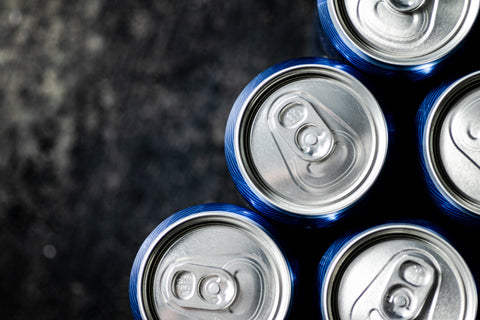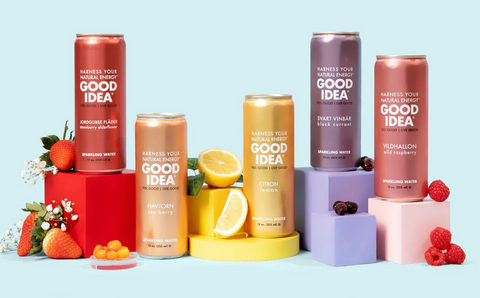Negative Effects of Energy Drinks: Understanding the Buzz-Kill

In a fast-paced world where energy is a prized commodity, the allure of energy drinks is undeniable. With their promises of instant vitality and mental alertness, they have become a staple for late-night study sessions, demanding work hours, or high-intensity training. However, the quick jolt of energy is not without its dark side.
In this article, we will explore energy drink side effects, from their ingredients to their impact on our health.
The Ingredients: A Potent Mix
Energy drinks are typically marketed as a blend of ingredients that promise to give you an instant boost. These include caffeine, sugar, taurine, and various vitamins and minerals.
While these ingredients individually have their benefits, when combined in high doses, they can have adverse effects on our bodies.

Caffeine: More than a Simple Waker-Upper
Repeatedly consuming large amounts of caffeine and sugar to sustain energy levels can lead to caffeine dependence, making it difficult to function without the daily dose of energy drinks. This dependence can also cause withdrawal symptoms (such as headaches and irritability) when attempting to quit.
A staggering 36% of adolescents and young adults consume energy drinks regularly, oblivious to the fact that a single 16-oz beverage can pack the punch of two cups of coffee — and sometimes more! Overconsumption of caffeine can lead to bouts of anxiety, jitteriness, and increased heart rate.
Sugar Highs and Lows
To temper the bitter taste of caffeine, energy drinks often come sweetened with a variety of sugars and artificial sweeteners. This overload of sweetness not only adds undesired calories but can also lead to spikes in blood sugar, followed by a familiar crash.
Overconsumption of energy drinks as a whole has been linked to an increased risk of obesity, heart disease, and type 2 diabetes. The high sugar content in these beverages can also lead to tooth decay and other dental problems.
Heart Health and the Shock to the System
For people with underlying heart problems, the immediate effect of an energy drink can be catastrophic. The caffeine content and cocktail of other ingredients can create a perfect storm for heart palpitations, chest pain, or, in extreme cases, heart attacks.
Mentally, the effects of energy drinks can be just as harmful. The quick spike in energy followed by a crash can disrupt our natural sleep patterns, leading to fatigue and difficulty concentrating. Long-term consumption has also been linked to increased anxiety, restlessness, and even depression.

Introducing GOOD IDEA: A Refreshingly Healthful Alternative
With all these concerns, it's high time to consider an alternative that offers sustained energy without the drawbacks. Enter GOOD IDEA, a healthy sparkling drink designed to keep you hydrated and energized without caffeine, sugar, or artificial sweeteners..
What Sets GOOD IDEA Apart?
GOOD IDEA is a carefully crafted blend of amino acids and chromium picolinate, scientifically designed to stabilize blood sugar. By stabilizing blood sugar we can sustain our natural energy levels without the harmful side effects.
Amino Acids and Chromium for a Healthy Energy Boost
GOOD IDEA contains a unique blend of amino acids and chromium that work together to provide sustained energy and mental clarity without the crash.
Let's take a look at amino acids. Amino acids are essential for so many things, such as forming collagen, elastin, and even tooth enamel. And guess what? GOOD IDEA contains a blend of five of the best ones: L-leucine, L-threonine, L-lysine monohydrochloride, L-isoleucine, and L-valine.
These five amino acids work together to give you a glucose-reducing effect. They're like a dream team for your metabolism - helping slow down gastric emptying and priming your body for all the goodness that comes with each sip of GOOD IDEA.
But don't just take our word for it, let's break it down.
First, let's talk about three amino acids that are total game-changers: leucine, isoleucine, and valine. These amino acids are part of the BCAA squad (branched-chain amino acids) and have some serious superpowers. Not only do these BCAAs have a major impact on glucose metabolism, glycogen synthesis, and insulin sensitivity - they also play a key role in hormone production and protein synthesis.
Threonine is also an absolute rockstar when it comes to maintaining protein balance in your body. But that's not all - threonine also helps form collagen, elastin, and even tooth enamel. Plus, Threonine is both glucogenic and ketogenic, meaning that it can be converted into glucose or degraded directly into acetyl-CoA
Threonine is commonly found in cheeses, meats, fish, and poultry so individuals on vegan and vegetarian diets are susceptible to experiencing low levels of threonine.
Last, but not least... we have lysine. Not only is lysine crucial for collagen and cartilage synthesis, but it also helps convert fatty acids into energy and keeps that cholesterol in check.
What Is Chromium Picolinate?
Let’s talk about a dietary mineral called chromium picolinate. Did you know up to 90% of Americans aren't getting enough of this crucial nutrient in their daily diet? Our bodies can't produce chromium on their own, so we need to make sure we're getting enough through our food.
Not only does chromium help with insulin and cholesterol levels, but it can improve your postprandial glycemic control (that's just a fancy way of saying how your body handles sugar after a meal). And for one in five Americans with metabolic syndrome, improved insulin sensitivity and glucose control can reduce the likelihood of disease and improve overall longevity.
When combined with the five essential amino acids found in GOOD IDEA (L-Leucine, L-Threonine, L-Lysine Monohydrochloride, L-Isoleucine, L-Valine), chromium picolinate becomes a powerhouse.
Together, these ingredients have been shown to reduce post-meal blood sugar by an average of 25%. This reduction helps to stabilize energy levels, reduce cravings, and improve metabolic health

Natural Ingredients Equals Natural Energy
GOOD IDEA's commitment to sourcing natural ingredients means you get the buzz-free benefits of sustained energy levels without putting your health at risk. All our drinks are also free from artificial sweeteners, preservatives, and food coloring.
Energy Drink Pros
- Quick energy boost
- Convenient
- Widely available
Energy Drink Cons
- High caffeine content
- High sugar content
- Unhealthy ingredients
GOOD IDEA Pros
- Sustained energy without the crash by helping to stabilize blood sugar
- Natural ingredients
- Promotes healthy metabolism
GOOD IDEA Cons
- Not as easily accessible as traditional energy drinks
FAQs
Q: Can I drink energy drinks while pregnant?
A: It is not recommended to consume energy drinks during pregnancy due to their high caffeine and sugar content.
Q: Is it safe to mix alcohol with energy drinks?
A: Mixing alcohol with energy drinks can be dangerous as the caffeine can mask the effects of alcohol, leading to overconsumption and potential harm.
Q: Are there any long-term effects of consuming energy drinks?
A: Studies have shown that regular consumption of energy drinks can lead to increased risk of heart problems, sleep disorders, and other health issues. It is best to limit or avoid these beverages altogether.
Q: Can energy drinks cause dehydration?
A: Yes, the high caffeine and sugar content in energy drinks can lead to dehydration if energy drink consumption is not balanced with adequate water intake.
Q: Are there any age restrictions for consuming energy drinks?
A: Some countries have regulations on the minimum age for caffeinated energy drink consumption due to their potential health risks. We recommend consulting with a doctor before giving energy drinks to children or adolescents.
Q: Can energy drinks help with weight loss?
A: While the caffeine in some energy drinks may increase metabolism, the high sugar content and overall unhealthy nature of these beverages can hinder weight loss efforts. It is not recommended to rely on energy drinks for weight loss purposes.
Q: Are there any alternatives to traditional energy drinks?
A: Yes, there are many healthier options for boosting energy such as drinking water, eating fruits and vegetables, or choosing functional beverages like GOOD IDEA.

Q: Can energy drinks improve athletic performance?
A: While some athletes may use energy drinks as a quick boost before a competition, the ingredients in these beverages can have negative effects on athletic and physical performance, as well as recovery. We recommend that you stick with natural, whole foods for sustained energy during exercise.
Q: Do energy drinks contain any vitamins or nutrients?
A: Most energy drinks do not contain significant amounts of essential vitamins or nutrients. The high levels of caffeine and sugar may deplete important nutrients in the body.
Q: Can energy drinks cause anxiety or panic attacks?
A: The high caffeine content in energy drinks can trigger anxiety and even panic attacks in some individuals, especially those with underlying mental health issues. It is important to be cautious when consuming these beverages.
Q: Can energy drinks be addictive?
A: The high levels of caffeine and sugar in energy drinks can lead to dependency and addiction if consumed regularly. It is important to monitor your caffeine intake and limit consumption for overall health.
Q: Can energy drinks be harmful even in small quantities?
A: Yes, even one can of an energy drink can have negative health effects on the body, especially if consumed regularly. It is best to limit or avoid these beverages altogether for optimal health.
Q: Do energy drinks provide any health benefits?
A: While some components in energy drinks may offer small health benefits, such as improving focus or aiding in digestion, the overall negative impact of caffeine and sugar outweighs many potential benefits.
Q: How much caffeine is considered safe to consume in a day?
A: The FDA recommends no more than 400 mg of caffeine per day for healthy young adults. However, this can vary based on individual sensitivity and health conditions.
Q: Are there any risks associated with mixing energy drinks and medications?
A: Yes, certain medications can interact negatively with the ingredients in energy drinks. That’s why it is important to consult with a doctor before consuming these beverages if you are taking any medication.

Q: Can energy drinks cause heart problems or other serious health issues?
A: Caffeine does not appear to increase the risk of stroke or heart disease in most people.
Multiple studies have shown, however, that it can raise blood pressure due to its stimulatory effect on the nervous system (check those studies out here, here, and here).
Q: Are all energy drinks created equal?
A: No, not all energy drinks are the same. Some sports drinks may contain more caffeine, sugar, or unhealthy ingredients than others. It's important to read labels and choose wisely if you do decide to consume energy drinks.
Q: Is it safe to drink more than one energy drink in a day?
A: It is not recommended to consume multiple energy drinks in a day, as this can lead to high levels of caffeine and sugar in the body which can have negative effects on health.
The Final Sip
When it comes to your health, the final decision is yours. Understanding the implications of the beverages you consume will empower you to make better choices. GOOD IDEA is not a magic bullet, but compared to many energy drinks, it is a functional drink that makes . . . well, a good idea.
In the end, our bodies need real, sustainable energy — not just a quick fix. GOOD IDEA is here to show you that there is a better way. Choose health and vitality without compromise.
Click here to learn more about how a simple substitution in your daily routine can lead to long-term health benefits!



